The stigma of being an atheist in the US
- Published
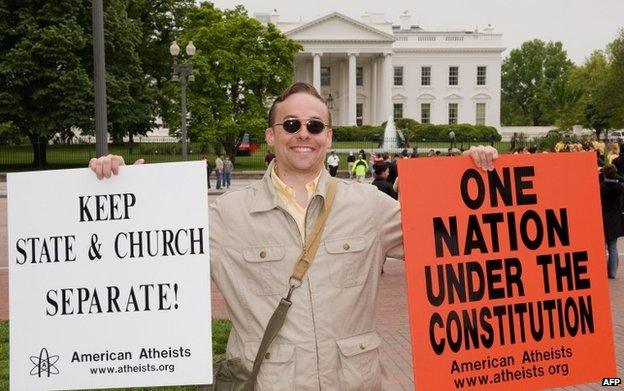
Atheists in the US are rallying together, launching a new TV programme and providing support for those who go public with their beliefs.
"Sometimes things need to be said, and fights need to be fought even if they are unpopular. To the closeted atheists, you are not alone, and you deserve equality."
So goes the rousing speech from the American Atheists president, David Silverman, in the opening moments of the first US television broadcaster dedicated to those who do not believe in God, Atheist TV.
A series of testimonies from prominent atheists then follows.
"It's one of the best decisions I've ever made in my life and I completely advocate people 'coming out'," says Mark Hatcher, from Black Atheists of America.
"Coming out" is how many atheists in the USA describe what remains, for many, a very difficult admission to make publicly.
At one of the biggest gatherings of atheist students in the country, in Columbus, Ohio, Jamila Bey from the Secular Student Alliance said there were many attendees who were nervous about being interviewed and had indicated so by what they were wearing around their neck.
"Red lanyards mean 'You may not talk to me'," says Bey. "A number of the students we have aren't 'out'. Their parents may not know that they are atheist or questioning their religion."
She said many were worried about being ostracised or were even scared of violence if they revealed they did not believe in God.
Lasan Dancay-Bangura, 22, is happy to talk to us. He is, after all, head of his university's atheist student group. He lets out a deep, sad sigh as he recalls the moment he told his mother he was an atheist.
"Things were really not good to begin with. She was so angry," he says.
"After a while I think she just accepted it. We still don't talk about it. It looks like she's not going to kick me out."
Dancay-Bangura admits that he still has not told his father.
"I don't want our relationship to be destroyed because of that," he says. "You hear it all the time."
"And you hear about people being kicked out, and sent to bible camps where they're forced to be religious. I don't want to lose my father to that."
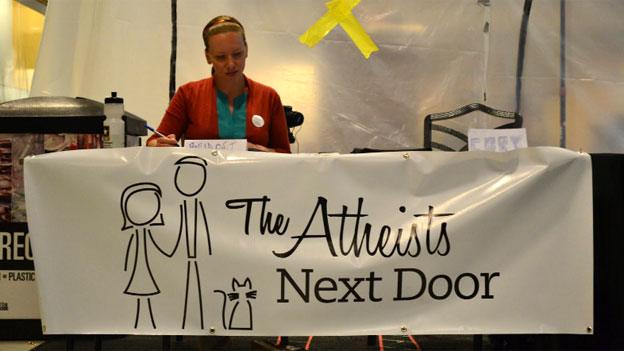
A student atheism convention took place in Ohio
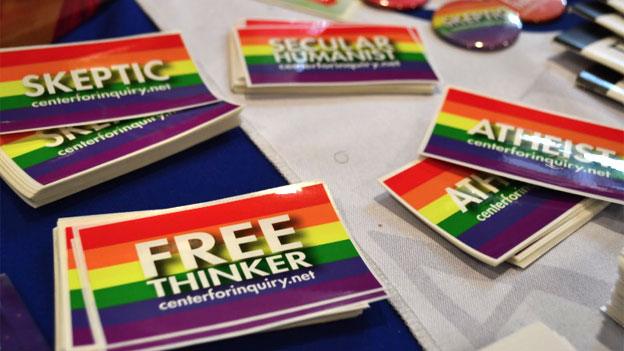
The parents of Katelyn Campbell, 19, from West Virginia, have been very supportive of her stance as an atheist. Her problem has been other members of the community. "In high school, when I walked down the hallway it would be completely silent, or I would be spat on," Katelyn says.
Two years ago, she protested against the inclusion of religion and abstinence in her school sex education classes. She is still feeling the impact.
"Often times I'm really uncomfortable being out in public spaces in my community at home because people often bring that discussion to my face, which is a discussion of values that are very personal and very private," she says.
A recent poll conducted by the Pew Research Centre shows Americans would rather have a president who was either in their 70s, or openly gay, or who had never held any public office than one that was atheist.
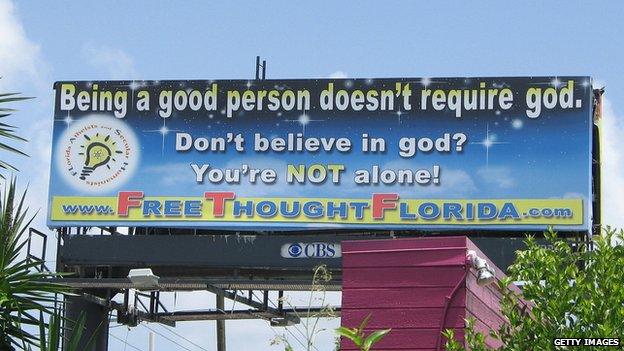
Astonishingly, a previous poll by Pew suggested respondents in the US regarded atheists as less trustworthy than rapists. One of Atheist TV's new phone-in programmes, The Atheist Experience, has already had a taste of how many Americans perceive "non-believers".
"So you were studying to be a minister, and now you don't believe in God? You're the devil," one caller tells the host. "You're a Marxist, you're an atheist and you're from Russia," says another.
At the atheist student event in Ohio, they are trying to change things.
T-shirts are laid out for sale on one of the vending tables. "Godless Goddess" says one; "This is what an atheist looks like" says another.
Beside the stall stands Andrew Seidel, an attorney for the Freedom from Religion Foundation. "Many Americans think they have never met another atheist, but that is because so many are afraid to publicly acknowledge it," says Andrew.
"The way we'll win this fight is because of demographics. Just like it was really important for the LGBT movement to come out of the closet, it's important for us to say it loud and say it proud, 'I'm an atheist!'"

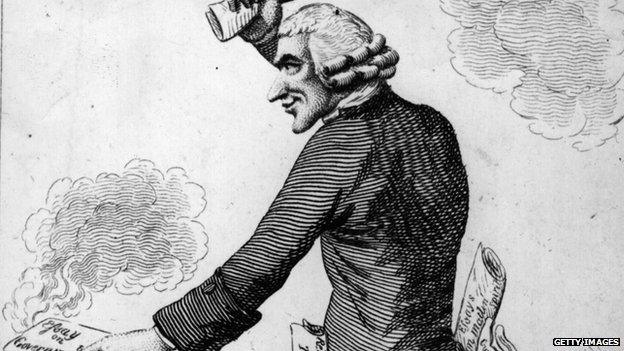
Chemist Joseph Priestley (1733 - 1804) was accused of atheism
Who is an atheist?
•2% of US adults say they are atheists
•67% of them are men
•26% of them see themselves as spiritual
Source: Pew Research Center

And it does appear the demographics are changing, particularly among the young, where the proportion of those identifying themselves as "religiously unaffiliated" is rising.
But America has a much higher proportion of people who say religion is very important to them as compared to European countries.
"America is an anomaly because, number one, we were founded by Puritans," says Jamila Bey from the Secular Student Alliance.
More recently, particularly for the African-American community in the civil rights struggle, but also for many other minority communities, Bey says she feels religion became a way of gaining acceptance.
"It was a way to say 'I'm a good Christian, you shouldn't turn fire hoses on me, and you should let my child go to the school with little white children, Jesus loves us all'," she says.
The new TV channel is part of atheist groups' own civil rights movement.
But real acceptance, particularly for those serving in public office, in a country where no serving congressman or woman is openly atheist, could still be some way off.